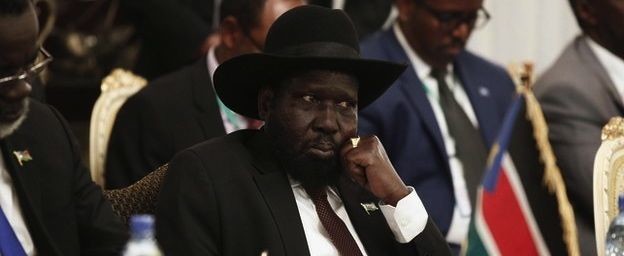The Inter-governmental Authority on Development (IGAD) and other foreign powers are pressuring South Sudan’s warring parties to reach a compromise deal at a summit ongoing in Addis Ababa, Ethiopia.
IGAD mediators gave a proposal to the parties this morning on the structure of a Transitional Government of National Unity in which both main warring parties SPLM-Juba and SPLM-IO would participate.
SPLM-Juba faction leader Salva Kiir and SPLM-IO faction leader Riek Machar met for hours last night and this morning in the presence of IGAD Chairman and Ethiopian Prime Minister Hailemariam Desalegn and Kenyan President Uhuru Kenyatta.
IGAD mediators gave their proposal to this ‘quartet’ of Kiir, Machar, Hailemariam and Uhuru, as well as to other negotiators.
Government Spokesman and SPLM-Juba faction leading member Michael Makuei hinted at some displeasure at the proposal on the part of the government, but other sources said that the warring parties are under big pressure to reach a deal today.
This afternoon the talks have been lifted temporarily for a period of six hours to allow the parties to make internal consultation on the IGAD proposal, before reassembling at 10:00 p.m. this evening.
According to a copy of the proposal obtained by Radio Tamazuj, the IGAD mediators have proposed a structure in which the president and prime minister each will have certain functions, while others will be “joint executive functions.”
It is expected that SPLM-Juba faction will retain the presidency while SPLM-IO will be given the newly created prime ministership.
Under this proposal the president shall be commander-in-chief of the armed forces and chair the council of ministers, while the prime minister shall chair sub-committees of cabinet and oversee government activities.
The president will have powers to appoint senior positions including prime minister, vice president, ministers and deputy prime ministers, in accordance with the peace agreement – which is expected to include a provision requiring the appointment of SPLM-IO members in certain roles.
For his part, the Prime Minister will have powers to appoint undersecretaries and heads of public corporations, as well as executive directors of commissions and other senior civil servants, subject to approval of the parliament, among other powers.
Meanwhile, the ‘joint executive functions’ will include the joint appointment and removal of governors, joint establishment of interim independent institutions and commissions including the judiciary and joint appointment of ambassadors, among other functions.
IGAD has defined the role of the deputy prime ministers saying they “shall be the principal assistants to the Prime Minister and shall be assigned ministerial portfolios.”
As to how the power-sharing agreement would work in practice, IGAD suggested that official communications between the two principals – widely expected to be Salva Kiir and Riek Machar – should take place in writing.
“The proposed model will work best when the key Principals namely the President and the Prime Minister work in a constant state of consultation.”
“While it is acknowledged that consultation will take different forms such as phone calls, memoranda and other modes of communication both written and electronic it is our recommendation that all decisions be rendered in writing to preclude conflict,” reads the proposal.
File photo: Salva Kiir
Related:
Kiir and Machar in lengthy talks in Addis (7 Nov.)
Photos: IGAD leaders at summit on South Sudan (6 Nov.)
Ethiopian leader presses for ‘breakthrough’ at summit (6 Nov.)




